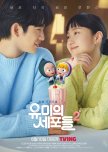Esta resenha pode conter spoilers
'Yumi's Cells' review: Back for a second chance at love and dreams
Is love sweeter the second time around or more cruel?
Yumi's Cells Season 2 tells the story of Yumi and Babi's relationship from her brain cells' point of view. Will she get her happy ending this time or will another heartbreak be added to her list?
For starters, Yumi's Cells illuminates Yumi's conflicted emotional life with superb storytelling, animation and performances. This k-drama is very inventive and psychologically astute, witty, imaginative, and utterly relatable.
What sticked to me the most from Season 1 was the seamless transition between the animation and the reality. However, for this new season the show hardly shed light on Babi's cells. His thoughts and true intentions remained a mystery throughout the run time. Perhaps this was a plot device to keep the audience glued to their screens and constantly wonder if Babi is her endgame.
In contrast to Season 2, Woong's cell village had a fair share of screentime. Woong and Babi's personalities are in opposite spectrum after all. Woong is an introvert and is not expressive. Babi on the other hand is a straightfoward guy and always speaks his mind to avoid confusions and misunderstandings.
Woong ponders a lot before talking that's why the cell village can discuss what tactic to take on. He doesn't even have that much cells because almost everything acts according to an program That speaks volume to how intelligent Woong is.
However, Babi is very eloquent with words (he's actually a marketing specialist) but we don't get to see enough decision making going in on at his cell village. We don't even get to see his naughty cell. All that Yumi's love cell saw in his village is that he is very romantic and sincere. Babi was at a very disadvantageous point because no one really knows what's going on in his head.
The two seasons also highlighted different concepts. Season 1 pointed out that opposites attract while season 2 condemns this by telling that same people attract each other. Woong and Yumi do not share the same interests, hobbies and group of friends. Interestingly, Yumi and Babi had a lot in common. This is what essentially draws Yumi to Babi. They both like reading books and listening to the same type of music. It seems logical that they attract each other as they think similarly. The absence of AI in Babi's village cell attests to this.
Going back to Babi's character development, I still had tons of questions about it. When the story reached its dilemmas, Babi's change of heart suddenly doesn't make sense to me.
Babi is someone who speaks his mind and it is very unlikely of him to hide secrets and get swayed by a young intern. Those were my first thoughts. However, looking back at Babi's past actions and relationships, it seems like he's not the green flag guy we all thought he is. He's actually the opposite.
If one can remember, Babi actually developed his feelings for Yumi even while they were both in a relationship. Reason and sensitivity cells tried so hard to hide this fact from Yumi. The alarming red flag about Babi is that he gets wavered easily whenever his girlfriend is not around which is a very unfaithful thing to do. I really felt defeated and saddened by this realization because who on earth can resist Babi's charming and alluring presence? He's simply irresistable and attractive.
I can't help but notice the similarities between Babi and Yijin from Twenty Five Twenty One. Everyone keeps telling that Yijin is a green flag for being a supportive and understanding boyfriend to Heedo. The same thing can be applied to Babi.
Both guys are very considerate towards their partners. However, kindness is not the foundation of being a green flag. Both main leads failed to be consistent, honest and maintain an open communication. Babi and Yijin kept secrets from their partners — the former not telling Yumi how he got affected by an intern's confession as well as when he got in an accident; while the latter not telling his SO that he is going through a rough patch and he doesn't want to share his burden, pain and sorrows.
Still, one can't help but feel that the writers did dirty on Babi by the second half of the show. The sweet and romantic moments between Babi and Yumi were actually based on Yumi and Soonrok's scenes in the webtoon. The directors and writers purposefully led us to the thinking that Babi is a wonderful and dreamy partner. We, the audience, got fooled and disappointed at the end. I personally really felt that it was hard to let go someone like Babi.
As for the performance, Kim Go Eun and Jinyoung's chemistry was insane to say the least. They portray immense love for each on-screen and it's undeniable that they would make such a great couple in real life. Their soft face features compliment each other. I hope that they can work on a project soon with a HEA.
Overall, Yumi's Cells is a lovely kdrama which transforms emotional conflict into an adventure. There's a beauty and care in every scene of this k-drama. As we tag along Yumi's self-actualization journey, we learn about the pain of growing up, heartbreaks and handling big, new emotions as they come and go.
Yumi's Cells Season 2 tells the story of Yumi and Babi's relationship from her brain cells' point of view. Will she get her happy ending this time or will another heartbreak be added to her list?
For starters, Yumi's Cells illuminates Yumi's conflicted emotional life with superb storytelling, animation and performances. This k-drama is very inventive and psychologically astute, witty, imaginative, and utterly relatable.
What sticked to me the most from Season 1 was the seamless transition between the animation and the reality. However, for this new season the show hardly shed light on Babi's cells. His thoughts and true intentions remained a mystery throughout the run time. Perhaps this was a plot device to keep the audience glued to their screens and constantly wonder if Babi is her endgame.
In contrast to Season 2, Woong's cell village had a fair share of screentime. Woong and Babi's personalities are in opposite spectrum after all. Woong is an introvert and is not expressive. Babi on the other hand is a straightfoward guy and always speaks his mind to avoid confusions and misunderstandings.
Woong ponders a lot before talking that's why the cell village can discuss what tactic to take on. He doesn't even have that much cells because almost everything acts according to an program That speaks volume to how intelligent Woong is.
However, Babi is very eloquent with words (he's actually a marketing specialist) but we don't get to see enough decision making going in on at his cell village. We don't even get to see his naughty cell. All that Yumi's love cell saw in his village is that he is very romantic and sincere. Babi was at a very disadvantageous point because no one really knows what's going on in his head.
The two seasons also highlighted different concepts. Season 1 pointed out that opposites attract while season 2 condemns this by telling that same people attract each other. Woong and Yumi do not share the same interests, hobbies and group of friends. Interestingly, Yumi and Babi had a lot in common. This is what essentially draws Yumi to Babi. They both like reading books and listening to the same type of music. It seems logical that they attract each other as they think similarly. The absence of AI in Babi's village cell attests to this.
Going back to Babi's character development, I still had tons of questions about it. When the story reached its dilemmas, Babi's change of heart suddenly doesn't make sense to me.
Babi is someone who speaks his mind and it is very unlikely of him to hide secrets and get swayed by a young intern. Those were my first thoughts. However, looking back at Babi's past actions and relationships, it seems like he's not the green flag guy we all thought he is. He's actually the opposite.
If one can remember, Babi actually developed his feelings for Yumi even while they were both in a relationship. Reason and sensitivity cells tried so hard to hide this fact from Yumi. The alarming red flag about Babi is that he gets wavered easily whenever his girlfriend is not around which is a very unfaithful thing to do. I really felt defeated and saddened by this realization because who on earth can resist Babi's charming and alluring presence? He's simply irresistable and attractive.
I can't help but notice the similarities between Babi and Yijin from Twenty Five Twenty One. Everyone keeps telling that Yijin is a green flag for being a supportive and understanding boyfriend to Heedo. The same thing can be applied to Babi.
Both guys are very considerate towards their partners. However, kindness is not the foundation of being a green flag. Both main leads failed to be consistent, honest and maintain an open communication. Babi and Yijin kept secrets from their partners — the former not telling Yumi how he got affected by an intern's confession as well as when he got in an accident; while the latter not telling his SO that he is going through a rough patch and he doesn't want to share his burden, pain and sorrows.
Still, one can't help but feel that the writers did dirty on Babi by the second half of the show. The sweet and romantic moments between Babi and Yumi were actually based on Yumi and Soonrok's scenes in the webtoon. The directors and writers purposefully led us to the thinking that Babi is a wonderful and dreamy partner. We, the audience, got fooled and disappointed at the end. I personally really felt that it was hard to let go someone like Babi.
As for the performance, Kim Go Eun and Jinyoung's chemistry was insane to say the least. They portray immense love for each on-screen and it's undeniable that they would make such a great couple in real life. Their soft face features compliment each other. I hope that they can work on a project soon with a HEA.
Overall, Yumi's Cells is a lovely kdrama which transforms emotional conflict into an adventure. There's a beauty and care in every scene of this k-drama. As we tag along Yumi's self-actualization journey, we learn about the pain of growing up, heartbreaks and handling big, new emotions as they come and go.
Esta resenha foi útil para você?


 3
3 2
2





















